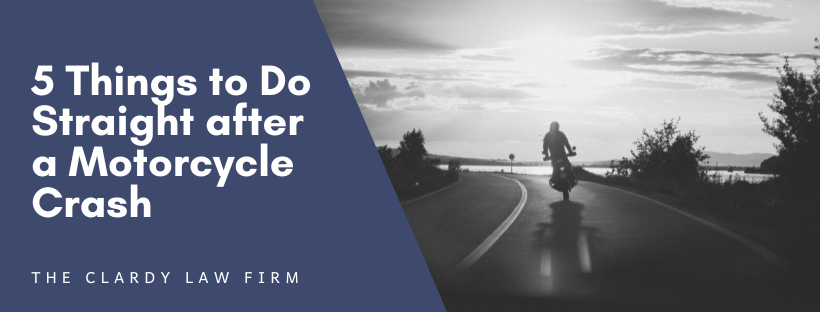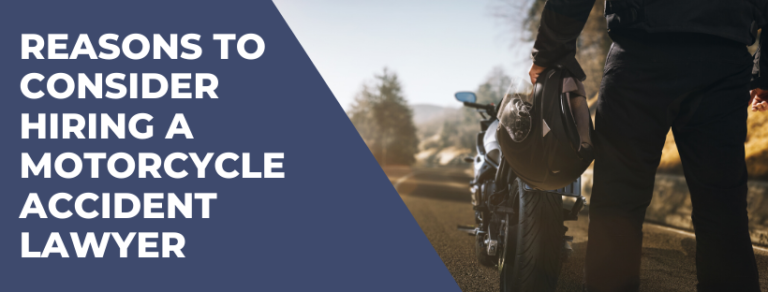If you ride a motorcycle, you’ll be more than aware of the dangers for a motorcyclist. Despite motorcyclists only making up about 5% of all drivers, there’s a much higher chance of being in an accident. Vigilance is crucial, but even the most experienced motorcyclist faces the risk of being in a motorcycle crash. Unfortunately, a motorcycle crash is often fatal, and in 2017, 14% of all traffic fatalities were motorcyclists.
Any number of reasons can cause a motorcycle crash. Maybe you lost control on a slippery surface, another driver made a mistake, or you hit a pothole. Whatever causes the accident, knowing what to do if it happens is essential for both your health and if you file a personal injury claim following the crash.
In the immediate aftermath of the accident, your adrenaline will be pumping, and you might be in shock. Learning what you need to do now will help you react if you’re ever involved in a crash. To help you stay safe, we’ve put together the five things you should do straight after a motorcycle crash.
What to Do after a Motorcycle Crash
Motorcycle accidents can happen at any moment and when you’re least expecting them. You might be riding your usual route to work or on a quiet highway. You’re more likely to be in an accident closer to home, with more than 52% of accidents happening within a five-mile radius of your home. For this reason, it’s essential to always pay close attention to your surroundings and to what other drivers are doing when you are riding.
1. Get Yourself to Safety
The first thing you need to do if you are in a crash is to stay calm and assess your surroundings. An accident is a traumatic experience, and by remaining calm, you can ensure your safety. Once you have considered your surroundings, you need to ensure you have no severe injuries. Head injuries are common in a motorcycle crash, and so you need to make sure you are safe before anything else. Keeping your helmet on while still on or near the road is essential.
If you’re confident that you are OK, then you need to take everything else into account. If you’re still on the road, move yourself to a safe location and then phone the police. If others, like a pillion passenger or another vehicle, are involved in the accident, you should also call paramedics. You must stay on the scene until the police and paramedics arrive to avoid any hit-and-run accusations. While you should always phone the police if you have an accident, it’s also crucial for later claims.
2. Seek Medical Assistance
Regardless of how minor you think your injuries are, you should always seek medical attention after an accident. If you have crashed your motorcycle, adrenaline will mask a lot of the pain from potentially serious injuries. Serious injuries may not be apparent straight away and can take days, weeks, or even months to appear. Getting checked by a medical professional means that you can be sure you don’t have any hidden, potentially life-threatening injuries.
Alongside ensuring that you are safe following the crash, you should also seek medical attention for any later claims. A doctor will check if you have any injuries and document them, which can later serve as proof. If you fail to see a doctor, the other party’s insurance company can claim that you did not sustain your injury during the accident.
3. Gather Evidence
Following an accident, your main concern will be your own health and the health of anyone else involved. While you should focus on your recovery, you should also do everything you can to collect evidence of the accident. Many personal injury claimants make the mistake of assuming the police or insurance companies will gather evidence for their claim.
One of the best ways to document your motorcycle crash is to take photos and videos of the accident’s aftermath. You should document:
- Your own vehicle
- Any other vehicles involved
- Road hazards
- Anything else of note.
Having this evidence can help to ensure that your claim is successful. But it’s not always possible to collect evidence at the scene. You can rely on the police report and your medical documentation in those cases. It also helps if you take the time to write down or record your account of the motorcycle accident. You should do this as close to the time of the crash as possible to ensure reliability.
4. Avoid Speaking to the Other Party’s Insurance Company
If your accident involves another vehicle, then it’s likely that the other party’s insurance company will reach out to you. They’ll ask you questions about the accident and usually try to win you over by showing sympathy and appearing to help. While they may genuinely care about your well-being, these questions are generally asked to determine the lowest settlement you’ll accept and find holes in your story.
If you can, avoid speaking to the insurance companies without legal advice. Be careful about what you reveal if you do talk to them, as even the most innocent of statements may be used against you later. Often, insurance companies use a variety of techniques to confuse claimants.
5. Hire a Personal Injury Lawyer
One of the best things to do following a crash is contact a good personal injury lawyer. Many people choose not to hire an injury lawyer as they believe they will get a more considerable proportion of the settlement or assume that the insurance companies will arrange everything. But hiring a personal injury lawyer can help you in multiple ways.
Your injury lawyer will handle every element of the case, including requesting medical records and police reports on your behalf and gathering evidence. They will also have experience dealing with insurance companies to get the highest possible settlement. But alongside that, they will support you throughout the case and allow you to focus on recovering without the stress of a personal injury claim.
Protecting Yourself from a Motorcycle Crash
While motorcycle crashes are common, there are several things you can do to avoid an accident and protect yourself if you are ever in one. To help you and other motorcyclists stay safe on the road, we’ve put together the five essentials of motorcycle safety:
- Always wear a helmet — Head injuries are the leading cause of death for motorcycle injuries, so you must always wear a helmet.
- Be aware of your surroundings — Staying alert to what is around you, road conditions, and the weather is crucial for staying safe while riding.
- Give large vehicles enough space — Large vehicles have substantial blind spots, which means that if you’re too close, you’re invisible to them. Give them enough space so that they can see you.
- Avoid distractions — Staying hyper-aware of everything around you is crucial. Distractions like phones put you at risk as they lower your reaction time and give you less control of your motorcycle.
- Educate any passengers — If you regularly have a passenger on rides, make sure they know not to distract you and learn to react to certain maneuvers. If you can, practice having a passenger in a safe environment before using roads.
Been in a motorcycle crash and need a personal injury lawyer? File your claim with our dedicated attorneys at The Clardy Law Firm. We can evaluate your case and ensure you have a solid case before proceeding. Get in touch today for a free, no-obligation consultation by calling (864) 233-8888 or filling out our contact form.




